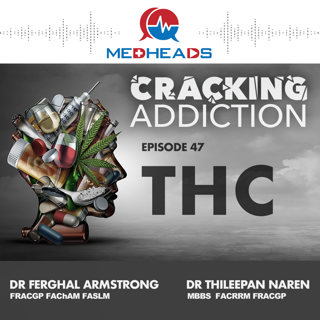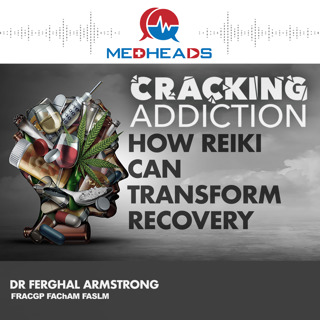
From Fear to Freedom: How Reiki Can Transform Recovery
Dr Ferghal introduces us to Helen, a Reiki master, who delves into the origins of Reiki and its application in addiction recovery. Discover the transformative power of Reiki healing and how it can complement traditional methods of treatment for substance use disorders. Gain insights into the emotional causes of addiction and explore how Reiki can aid in relapse prevention and detoxification. Join us as we unravel the potential of Reiki in supporting individuals on their journey to recovery from addiction.**Focus Keyword:**Reiki in Addiction Recovery**Key Points:**- Learn about the origins of Reiki and how it was discovered by Mikaya in the 18th century.- Understand the Reiki healing process and how it can help individuals release fear and emotional traumas.- Explore the role of Reiki in addiction recovery, including aiding in detoxification, relapse prevention, and addressing underlying emotional causes of addiction.- Discover the levels of Reiki attunements and the benefits of each stage in personal healing and helping others.**Quote:**"Ask not why the drug, but why the pain." - Dr Ferghal Armstrong**Learning Outcomes:**1. Understand the origins of Reiki and its connection to traditional healing practices.2. Explore the role of Reiki in releasing fear and emotional traumas in addiction recovery.3. Learn about the levels of Reiki attunements and their significance in personal healing and growth.4. Discover the potential benefits of Reiki in detoxification, relapse prevention, and addressing the emotional root causes of addiction.**Actionable Takeaways:**1. Consider incorporating Reiki as a complementary therapy in addiction recovery programmes to support emotional healing.2. Explore the practice of Reiki for personal healing and self-care, starting with Reiki Level 1 attunement.3. Investigate the role of Reiki in reducing fear and anxiety during the recovery process and consult with a Reiki master for guidance.4. Reflect on the emotional causes of addiction and how Reiki may assist in addressing and releasing these underlying issues.
29 Maj 202418min
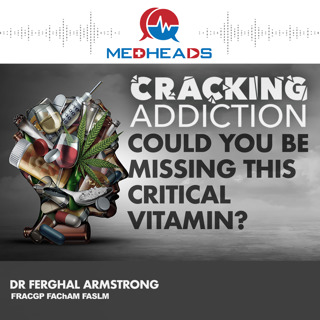
Could You Be Missing This Critical Vitamin?
In this episode, Dr Ferghal Armstrong and Dr Richard Bradlow unpack the complex relationship between alcohol, thiamine deficiency, and the severe neurological condition Wernicke’s encephalopathy. Ferghal opens by questioning long-held beliefs about alcohol’s direct effects on thiamine absorption, while Richard provides a contextual understanding of the symptomatic manifestations. The discussion touches on the practicalities of diagnosing and treating thiamine deficiency, focusing particularly on clinical scenarios where immediate action can prevent irreversible damage.**Learning Outcomes**1. **Understanding Thiamine Deficiency and Alcohol Use**- Thiamine deficiency is commonly seen in individuals with alcohol use disorders due to poor diet, liver damage, and compromised gut integrity. Ferghal emphasises that alcohol does not directly reduce thiamine but affects its absorption and storage indirectly.- Recognise the critical symptoms of thiamine deficiency: Ataxia, ophthalmoplegia, and confusion. Richard shares that only 10% of individuals present with the classic triad, stressing the need for a low threshold in administering thiamine.- Ferghal reveals that thiamine is stored in the liver, with approximately 20-30 milligrams available. Without replenishment, these levels deplete quickly, making regular intake essential.2. **Diagnosis and Management**- Learn to assess risk factors beyond alcohol consumption. Richard suggests evaluating diet, liver health, and any conditions that hamper gut absorption.- Understand the importance of high-dose, parenteral thiamine administration in suspected cases of Wernicke’s encephalopathy. This prevents irreversible neuronal damage, particularly in the cerebellum and midbrain.- Find out why rapid thiamine delivery is critical. Ferghal explains that alcohol withdrawal demands a higher energy output, which depletes thiamine stores faster, precipitating encephalopathy.3. **Preventative Measures and Harm Reduction**- Recognise the importance of thiamine supplements for those engaging in hazardous drinking, even if not experiencing withdrawal. Richard advocates for over-the-counter vitamin B1 tablets, taken multiple times daily for optimal absorption.- Explore how diet can play a crucial role in preventing thiamine deficiency. Liver, cereals, and fortified foods are excellent sources of thiamine, as Ferghal points out.- Koraskoff’s syndrome is an irreversible consequence of untreated thiamine deficiency. It leads to significant memory deficits and an ataxic gait, which underscores the need for timely intervention.**Actionable Takeaways**1. **Routine Screening for Thiamine Deficiency**- Incorporate routine screening for thiamine deficiency in patients with alcohol use disorder. Ferghal and Richard highlight this as a vital practice to prevent conditions like Wernicke’s encephalopathy and Korsakoff syndrome.- Develop a checklist for evaluating risk factors, including dietary patterns, liver function, and gut health issues.- Push for early intervention even with subclinical symptoms. Ferghal stresses the colossal benefits of early detection and treatment.2. **Educate on Thiamine Supplementation**- Ensure patients receive clear instructions on thiamine supplementation. Richard recommends oral vitamin B1, taken in divided doses throughout the day.- Cultural and dietary recommendations should include foods rich in thiamine, like liver and fortified cereals.- Advocate for harm reduction strategies that include vitamin supplements. Ferghal points out this can significantly reduce the risk of severe neurological...
22 Maj 202423min
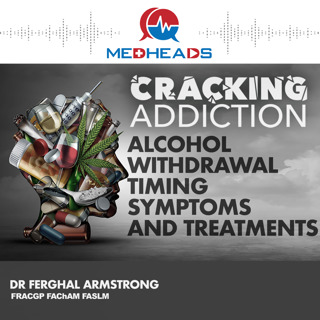
Understanding Alcohol Withdrawal: Timing, Symptoms, and Treatments
In the latest episode of "Cracking Addiction," Dr Ferghal continues the journey with Dr Richard, exploring the critical subject of alcohol withdrawal. This episode is particularly focused on the timings, the natural history of withdrawal symptoms, and the potential complications faced during alcohol detoxification. The discourse provides key insights on when symptoms typically appear, ranging from mild to severe cases, and discusses methods of intervention based on the severity of withdrawal symptoms.**Learning Outcomes:**1. **Understanding the Onset of Alcohol Withdrawal:** This episode helps listeners grasp the variable onset of alcohol withdrawal symptoms which can appear from 12 to 24 hours after the last drink. Ferghal and Richard explain the concept of 'day two' of withdrawal, enhancing understanding of the physiological changes happening in the body during this time.2. **Risk Factors and Complications:** The conversation thoroughly covers potential complications, such as seizures and delirium tremens. It emphasizes the importance of recognizing past withdrawal histories and comorbidities that heighten withdrawal complications, which proves crucial for healthcare providers in assessing risk.3. **Ethical and Effective Treatment Strategies:** Highlighting the dangers of protocol-driven approaches in detoxification settings, Richard points out the importance of tailored treatment plans. They discuss the use of diazepam to manage symptoms effectively and the strategies to mitigate risks such as 'kindling.'4. **Proper Management of Seizures and Delirium:** Key strategies for managing severe withdrawal symptoms like seizures and delirium tremens (DTs) are elaborated on, including the avoidance of certain medications and the focus on benzodiazepine regulation.**Actionable Takeaways:**1. **Recognise the Early Signs:** Listeners are encouraged to identify early withdrawal symptoms to initiate timely treatment, potentially preventing the escalation towards more severe complications such as DTs.2. **Avoid High-Protocol Rigidity:** The importance of flexibility in treatment protocols was underscored, stressing individual patient needs over rigid guidelines, which might prevent effective symptom management.3. **Prepare For Seizure Management:** Understanding that alcohol withdrawal seizures could peak around 24 hours post-last ingestion, healthcare providers should monitor and adjust benzodiazepine dosages accordingly.4. **Psychosocial Aspects of Withdrawal:** Addressing withdrawal is not just about managing physical symptoms but also involves supporting the patient’s psychological well-being to enhance recovery success rates.
15 Maj 202424min
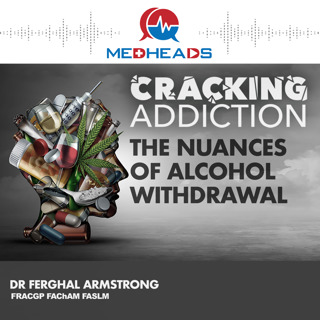
The Nuances of Alcohol Withdrawal: Assessment and Management Insights
In this riveting episode of Cracking Addiction, Dr Ferghal Armstrong and Dr Richard Bradlow shed light on the complex issue of alcohol use and withdrawal, providing critical insights and practical guidance for individuals and healthcare professionals alike. The duo explores detailed diagnostic criteria and the implications of daily alcohol consumption and addresses the signs that might indicate a move towards severe withdrawal symptoms. Learn about the societal impacts of drinking norms and the misconceptions that might be putting individuals at risk without them even realising it. This episode uncovers the stark differences between casual drinking and potential alcohol dependence that could lead to serious health consequences.**Learning Outcomes:**1. Understand the varied patterns of alcohol withdrawal and how personal history affects its likelihood. Richard emphasizes the importance of individual patient history in predicting withdrawal symptoms such as seizures.2. Discover the guidelines for safe alcohol consumption set by different governments and how they compare, highlighting discrepancies that might affect public health advice. Particularly, the comparison between Australian, Canadian, and American standards provides a global view of alcohol consumption benchmarks.3. Recognize the clinical signs of alcohol withdrawal, applying both psychological and physiological markers, including the mnemonic PAST NIGHT (Psychomotor Agitation, Anxiety, Seizures, Terrors, etc.) proposed by Ferghal for easier recall during assessments.4. Learn about the significant risks associated with ignoring other potential diagnoses when a patient presents symptoms similar to alcohol withdrawal, underscoring the necessity of comprehensive medical evaluation.
8 Maj 202422min
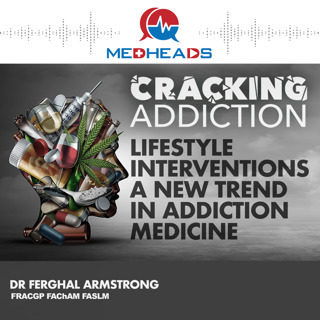
Lifestyle Interventions: A New Trend in Addiction Medicine
Dr Ferghal Armstrong explores the profound impact of lifestyle interventions on addiction recovery, focusing on the crucial role of tobacco cessation within the addiction and mental health treatment spaces. Dr Armstrong discusses recent AOD (Alcohol and Other Drugs) guidelines that integrate lifestyle medicine, highlighting how these can dramatically improve patient outcomes. The discussion extends to the implications of smoking on the efficacy of psychiatric medications and overall prognosis for individuals with mood disorders.**Learning Outcomes:**1. Understand the six pillars of lifestyle medicine as detailed by Dr Armstrong, which include the feet, the fork, the fingers, sleep, stress management, and social connection. The episode elucidates how each pillar contributes to comprehensive addiction recovery and overall mental health enhancement, emphasising the multifaceted approach required for effective treatment.2. Gain insights into the interactions between tobacco use and psychiatric medications, learning why smoking cessation is not merely beneficial but essential for patients undergoing treatment for mood disorders and other mental health issues. Dr Armstrong explains how smoking can alter medication efficacy and overall treatment trajectories.3. Explore the impact of the latest AOD guidelines, which advocate for lifestyle interventions during withdrawal periods. These guidelines offer a new perspective on managing withdrawal by integrating lifestyle improvements that can lead to more successful recovery outcomes.4. Recognise the broader implications of alcohol consumption as discussed by Dr Armstrong, including detailed comparisons of standard drink measurements and guidelines in different regions, which underline the global variations in alcohol consumption recommendations.
1 Maj 202412min
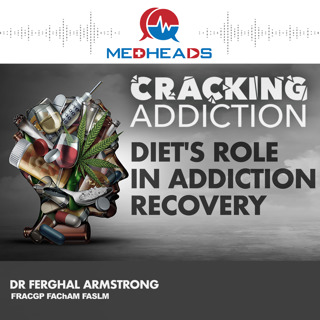
Diet's Role in Addiction Recovery
Dr Ferghal Armstrong addresses the often-underestimated influence of diet on addiction recovery and mental health. By contrasting Australian Dietary guidelines with the detriments of ultra-processed "junk" food, Ferghal uncovers the profound impact that food choices have on our overall health and capacity to overcome addiction. Exploring various diets, such as the Mediterranean, DASH, and MIND diets, Ferghal emphasizes the benefits of whole foods and the avoidance of high saturated fat, sodium, and processed sugars. Crucial connections between diet and risk of diseases, including cardiovascular issues, cancer, metabolic syndrome, and mental health disorders, are highlighted, making a strong case for the fork's role in lifestyle medicine.00:00 Dr. Fergal Armstrong discusses lifestyle medicine in addiction.03:49 Junk food linked to metabolic diseases, mental health.08:16 MIND diet reduces Alzheimer's risk, benefits mental health.
24 Apr 202410min
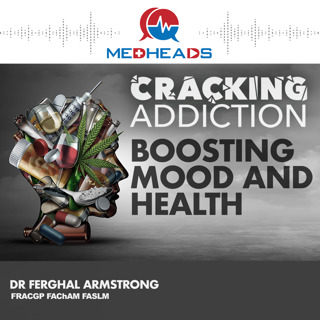
Boosting Mood and Health: Integrating Exercise into Addiction and Mental Health Treatment
Dive into this enlightening episode of Cracking Addiction and unearth the transformative role of exercise in the journey of addiction recovery. Dr Ferghal Armstrong meticulously illustrates how incorporating physical activity can fundamentally enhance the treatment and management of substance use disorders alongside co-occurring mental health issues. Whether you're a clinician, a person in recovery, or just passionate about improving mental and physical health, this episode offers invaluable insights that could shape your approach to holistic well-being.00:00 Prominence of lifestyle in addiction and mood disorders.05:41 Exercise improves mood; small amounts daily best.07:12 Exercise reduces cancer incidence and improves survival.10:16 Exercise has numerous positive effects on health
17 Apr 202410min
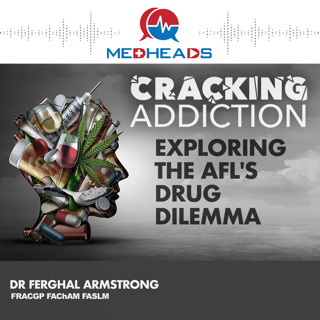
Exploring the AFL's Drug Dilemma: Care Plans versus Punishments in Professional Sports
Listen to this insightful episode of Cracking Addiction and unravel the complexities of substance use within the realm of professional sports, particularly the AFL. We delve into the controversial handling of illicit drug use among players, balancing the tightrope between medical treatment and role-model expectations. This discussion is crucial for anyone looking to understand the multifaceted approach to addiction and substance use in high-pressure environments. Join Dr. Ferghal Armstrong and guest journalist Max Laughton as they dissect the layers of policy, public perception, and personal care in the context of the AFL's recent drug use dilemma.The focus of this episode lies in the intricate policy and personal care considerations surrounding illicit drug use among AFL players. Max helps us unfold the doctor-patient confidentiality within clubs, the allegation of deception through manufactured injuries, and the tension between medical care and punitive actions. The conversation pivots to societal expectations of athletes as role models, the ethical conundra posed by possible performance enhancement, and the broader implications of substance use policies in sports. This episode offers a perspective shift urging compassion and understanding, instead of condemnation, in substance use management.Learning Outcome 1:Understanding the distinction between social substance use, addiction, and the role sports pressures play in substance use amongst AFL players. It is highlighted that not all substance use signals addiction and the pressures unique to AFL players can amplify the risks. Recognition of this nuance is crucial in addressing and managing substance use in professional sports. Ferghal articulates the importance of distinguishing occasional use from dependency and considering the broader psychosocial factors contributing to each player's situation.Actionable Takeaway 1:Encourage open dialogue about the psychosocial pressures associated with professional sports that could lead to substance use. Sports organizations can focus on preventive measures by fostering environments supportive of mental health and resilience training. It's essential to create an open forum for athletes to discuss their challenges without fear of punitive repercussions, cultivating a team culture that prioritizes well-being and support over punishment.Learning Outcome 2:The dilemma faced by AFL in balancing the medical model of substance use treatment with the expectation of punishment for 'misbehaviour'. AFL players caught using illicit substances aren't just athletes; they are individuals with complex personal circumstances and health needs. By exploring this sensitive terrain, listeners gain insight into the complexities of sports administration, ethical considerations, and the well-being of the players. Ferghal emphasizes the importance of treating substance use as a health issue rather than a criminal or purely disciplinary matter.Actionable Takeaway 2:Evaluate and potentially implement medical models of care for substance use amongst athletes in all sports sectors. By focusing on treatment rather than punishment, sports organizations can maintain the dignity of the player while addressing the health issue more effectively. Listeners involved in sports administration might consider advocating for or revising existing policies to integrate health-centric approaches to substance use.**Quote or Insight:**"AFL players caught using illicit substances aren't just athletes; they are individuals with complex personal circumstances and health needs." - Dr. Ferghal Armstrong.
10 Apr 202422min
